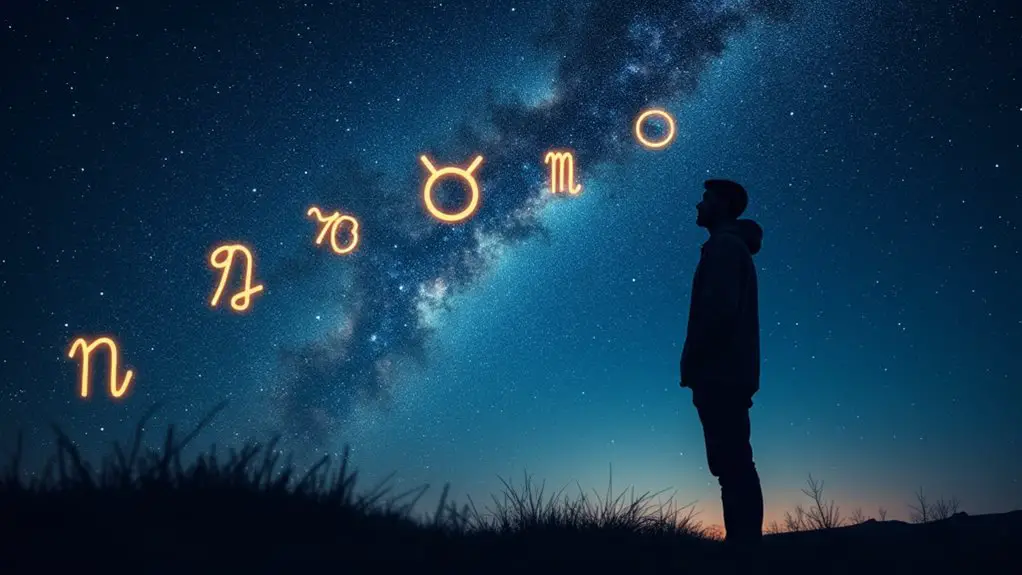Have you ever wondered about the mysteries of the stars and their influence on our lives?
Astrology, the ancient practice of studying celestial bodies to understand human behavior and predict future events, has fascinated people for centuries. It is a vast field with various types of astrology, each offering unique insights into our destinies.
Like a cosmic tapestry, Western Astrology weaves together the positions of the planets to reveal personality traits and life patterns.
Vedic Astrology, rooted in ancient Indian scriptures, delves deep into karmic influences and provides guidance on career, relationships, and spirituality.
Chinese Astrology, based on the lunar calendar, explores the animal zodiac signs to uncover personality traits and foresee fortunes.
Mayan, Celtic, Persian, Arabic, Aztec, and Hellenistic Astrology each offer their own cultural perspectives on the stars’ impact.
As you delve into the enchanting world of astrology, you’ll discover a rich tapestry of knowledge and insight that can help you navigate life’s journey with clarity and purpose.
Key Takeaways
- There are various types of astrology, including Western, Vedic, Chinese, Mayan, Celtic, Persian, Arabic, Aztec, and Hellenistic astrology.
- Each type of astrology has its own unique methods and interpretations based on different cultural and historical influences.
- Astrology can provide insights into personality traits, life paths, compatibility, suitable professions, and potential health issues.
- Different types of astrology offer practical guidance and can help individuals make informed decisions in various aspects of their lives.
Western Astrology
Western astrology, also known as sun sign astrology, focuses on the position of the sun at the time of a person’s birth and is widely popular in Western cultures. The evolution of Western astrology can be traced back to ancient Greece and Rome, where scholars like Ptolemy and Hippocrates developed the foundations of this practice. Over time, Western astrology has evolved and merged with other cultural beliefs, such as Egyptian and Babylonian astrology.
Today, it continues to be a significant aspect of modern astrology, with its influence seen in horoscopes, zodiac signs, and compatibility charts. Many people find comfort and guidance in Western astrology, as it offers insights into personality traits, life events, and the potential for personal growth. It has become an integral part of popular culture, shaping how we understand ourselves and our relationships with others.

Vedic Astrology
Vedic astrology, also known as Jyotish, offers insightful cosmic interpretations originating from ancient Indian scriptures.
With its rich cultural significance, Vedic astrology holds a special place in the hearts of many individuals seeking guidance and understanding.
This ancient practice is deeply rooted in the belief that celestial bodies hold profound influence over human lives and destinies.
Vedic astrologers utilize a variety of astrological techniques to analyze birth charts and make predictions about various aspects of life, including career, relationships, and health.
They carefully examine the positions of planets and their relationship with the individual’s birth time and location to gain a deeper understanding of their life’s purpose and potential challenges.
By delving into the depths of Vedic astrology, one can unlock profound insights and navigate life’s journey with greater clarity and purpose.
Chinese Astrology
Immerse yourself in the mystical realm of Chinese astrology, where ancient wisdom intertwines with celestial forces to unveil your destiny and guide you on a path illuminated by the enigmatic dance of the zodiac animals.
Chinese astrology, unlike its Western counterpart, is based on a twelve-year cycle, with each year represented by a different animal. These zodiac animals include the Rat, Ox, Tiger, Rabbit, Dragon, Snake, Horse, Sheep, Monkey, Rooster, Dog, and Pig. Each animal is believed to possess unique characteristics that influence the personality traits and destiny of individuals born in that year.
In addition to the zodiac animals, Chinese astrology also incorporates the concept of the Five Elements – Wood, Fire, Earth, Metal, and Water. These elements further shape an individual’s destiny and provide insight into their compatibility with others.
By understanding the intricate interplay of the zodiac animals and the Five Elements, one can gain a deeper understanding of themselves and their place in the universe.
Mayan Astrology
Mayan astrology, with its rich cultural heritage, offers a fascinating exploration of the cosmic forces that shape our destiny and provides a unique lens through which to understand our place in the world.
Mayan astrology is rooted in the belief that celestial interpretations can reveal profound insights into our lives. Similar to Western astrology, Mayan astrology also assigns zodiac signs to individuals based on their birth dates. However, the Mayan zodiac signs are represented by different animals, such as the jaguar, the monkey, or the eagle.
Each sign is associated with specific personality traits and characteristics, allowing individuals to gain a deeper understanding of themselves and their interactions with the world around them. Mayan astrology not only provides guidance for personal growth and self-discovery but also serves as a testament to the wisdom and complexity of ancient Mayan civilization.
Celtic Astrology
Explore the enchanting world of Celtic astrology and discover the profound connection between the cosmic forces and your own destiny. Celtic astrology is deeply rooted in the rich mythology and zodiac signs of the ancient Celtic people.
The Celts believed that each individual was linked to a specific tree, represented by different months of the year, which influenced their personality traits and life path. The Celtic lunar calendar played a crucial role in Celtic astrology, as the phases of the moon were believed to have a direct impact on human behavior and emotions.
By understanding the cycles of the moon, the Celts were able to predict and interpret the future. Celtic astrology offers a unique perspective on the cosmos and provides valuable insights into our own lives and destinies.
Egyptian Astrology
Now that we’ve explored Celtic Astrology, let’s delve into the captivating world of Egyptian Astrology. Egyptian astrology, much like its Celtic counterpart, has its own unique approach to understanding the stars and their influence on our lives.
In Egyptian astrology, the zodiac signs are represented by different Egyptian gods and goddesses, each with their own distinct attributes and qualities. These signs include Amon-Ra, the god of the sun, representing those born between March 21st and April 19th, and Hathor, the goddess of love and beauty, representing those born between April 20th and May 20th.
The influence of Egyptian mythology on astrology is profound, as it intertwines the celestial realm with the rich narratives of ancient Egyptian gods and goddesses. By studying Egyptian astrology, we gain a deeper understanding of how these mythological figures continue to shape and influence our lives today.
Native American Astrology
Native American Astrology offers a unique perspective on the influence of the stars and their connection to our lives, as it draws inspiration from the wisdom and spirituality of Native American cultures.
This ancient form of astrology focuses on the belief that each person is connected to a specific animal totem, which represents their personality traits and life path. The animal totem is determined by the individual’s birthdate and reflects their strengths, weaknesses, and spiritual qualities.
Additionally, Native American Astrology follows a lunar calendar, which means that the moon’s cycles play a significant role in predicting and understanding cosmic energies. By aligning with the natural rhythms of the moon, Native American Astrology provides guidance and insight into one’s destiny, relationships, and personal growth.
Tibetan Astrology
Tibetan Astrology offers a glimpse into the interconnectedness of the cosmos, weaving together the threads of our lives like a celestial tapestry. It has had a profound influence on Tibetan culture, shaping their beliefs and guiding their daily lives.
Tibetan astrology is unique in its practices, combining elements of both Indian and Chinese astrology. One of its distinctive features is the use of the lunar calendar, which plays a significant role in determining auspicious dates for important events such as weddings or business ventures.
Tibetan astrologers also analyze the birth charts of individuals, taking into account the time, date, and location of their birth to provide insights into their personality traits, strengths, and weaknesses. They believe that by understanding the influence of the planets and celestial bodies, one can navigate through life with greater awareness and make informed decisions.
Persian Astrology
Explore the enchanting world of Persian astrology and uncover the cosmic secrets that can illuminate your path in life.
Persian astrology, also known as Iranian astrology, has a rich history and a profound influence on modern astrology.
Here are three reasons why Persian astrology holds cultural significance in Persia and beyond:
- Deep Roots: Persian astrology dates back to ancient times, with roots in Zoroastrianism and Babylonian astrology. It has been passed down through generations, preserving its wisdom and traditions.
- Cosmic Connections: Persian astrology focuses on the relationship between celestial bodies and human existence. It believes that the movements of the planets and stars can shape our personalities, destinies, and even health.
- Practical Applications: Persian astrology offers practical guidance in various aspects of life, such as marriage, career, and health. It can provide insights into compatibility, suitable professions, and potential health issues, helping individuals make informed decisions.
Incorporating Persian astrology into your life can deepen your understanding of the universe and empower you to navigate life’s challenges with wisdom and clarity.
Arabic Astrology
Now that you’ve learned about Persian astrology, let’s delve into the fascinating world of Arabic astrology.
Arabic astrology has had a profound influence on Islamic culture, shaping beliefs and practices for centuries. This branch of astrology emphasizes the interpretation of celestial signs and their impact on human lives.
Arab scholars were particularly drawn to the study of astrology, as they believed it could provide insights into the future and guide their decisions. They developed intricate systems to analyze the positions and movements of celestial bodies, such as the sun, moon, and planets, in order to make predictions and understand their significance.
Arabic astrology not only played a crucial role in shaping Islamic civilization but also contributed to advancements in mathematics, astronomy, and medicine.
By exploring Arabic astrology, we gain a deeper understanding of the rich cultural tapestry of the Islamic world.
Aztec Astrology
Uncover the captivating realm of Aztec Astrology, where the celestial movements intertwine with the tapestry of your destiny.
Aztec astrology is deeply rooted in the rich cultural influences of the ancient Aztec civilization. This unique astrological system is based on the symbolism and meanings associated with various celestial bodies and animals.
Each day in the Aztec calendar is governed by a specific deity, animal, and element, which are believed to have a profound impact on an individual’s personality and life path. For example, the god Quetzalcoatl represents wisdom and knowledge, while the jaguar symbolizes power and strength.
By understanding the intricate connections between these celestial influences and our own lives, we can gain valuable insights into our strengths, weaknesses, and potential for growth. Aztec astrology offers a fascinating perspective on how the stars and planets shape our existence, providing a deeper understanding of ourselves and our place in the universe.
Hellenistic Astrology
Delve into the captivating world of Hellenistic Astrology, where the ancient Greeks unlocked the secrets of the stars to gain profound insights into human behavior and the course of destiny.
Hellenistic astrology refers to the astrological practices and beliefs that originated in ancient Greece during the Hellenistic period, which lasted from the 4th century BCE to the 2nd century CE. This period marked a significant shift in astrology, as it became more systematic and integrated with other disciplines, such as philosophy and mathematics.
Hellenistic astrology laid the foundation for the development of astrology as we know it today, and its influence can be seen in modern astrological practices. Its emphasis on the interpretation of birth charts, the use of planetary rulerships, and the analysis of planetary aspects continue to shape the field of astrology.
By studying Hellenistic astrology, we can gain a deeper understanding of the historical significance of astrology and its enduring impact on our lives.
Frequently Asked Questions
How accurate is astrology in predicting future events?
Astrology’s accuracy in predicting future events varies. While it may have some validity in medical predictions, ethical concerns arise when using it for future predictions. Consider its limitations and potential biases.
Can astrology be used to determine compatibility in relationships?
Determining relationship compatibility through astrology is a popular practice. By analyzing birth charts, astrology can provide insights into personality traits, emotional needs, and communication styles, helping individuals navigate their relationships. Additionally, exploring the influence of astrology on personal growth can deepen self-awareness and enhance interpersonal dynamics.
Are there any scientific studies that support the validity of astrology?
Scientific evidence and research studies have been conducted to determine the validity of astrology. These studies have found no substantial evidence to support the claims made by astrologers.
Can astrology provide insights into career choices and success?
Astrology can provide valuable insights into career choices and success. By analyzing your birth chart, astrologers can identify your strengths, weaknesses, and potential opportunities. This can help guide your decision-making process and support personal growth.
How can one get started in studying and practicing astrology?
To get started in studying and practicing astrology, begin by reading books, taking online courses, or finding a mentor. Learn about the different astrological systems, such as Western, Vedic, and Chinese, and practice interpreting birth charts and planetary transits.
Conclusion
So there you have it, dear reader. After delving into the vast world of astrology, we’ve explored the different types that exist.
From the ancient wisdom of Western and Vedic astrology to the intriguing traditions of Chinese, Mayan, Celtic, Persian, Arabic, Aztec, and Hellenistic astrology, each one offers its unique insights and interpretations.
It’s like having a celestial buffet of cosmic knowledge at your fingertips! So go forth, embrace the stars, and let the celestial dance guide you on your journey through life.
Remember, the universe is vast, and so is astrology!



